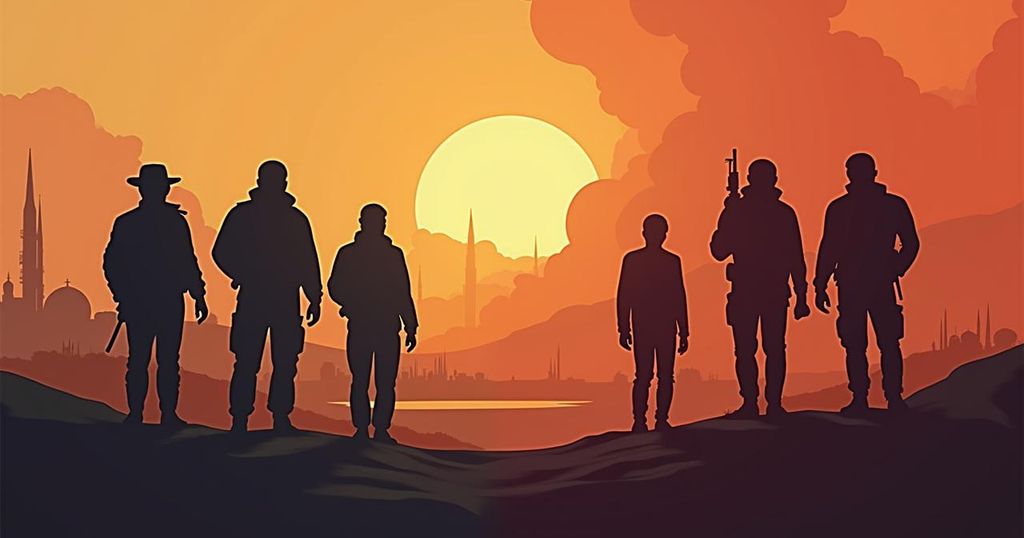Israel’s military campaign against Hezbollah has resulted in substantial disruption, including the killing of its leader Hassan Nasrallah. This action has sent a strong message to adversaries in the region, signaling a readiness for further military engagement. Hezbollah’s capability is in decline, while Iran grapples with its diminishing influence. As conflict risks escalate, calls for restraint and peace remain critical yet challenged by the realities on the ground.
Israel has undertaken an aggressive military campaign targeting Hezbollah, the Iran-supported Lebanese militant group, which has resulted in significant disruption within the organization. The recent elimination of Hassan Nasrallah, Hezbollah’s leader, has intensified this tactical offensive, with Israeli Defense Minister Yoav Gallant proclaiming that this action sends a decisive warning to adversaries intent on confronting Israel. Following this, further strikes were conducted against Hezbollah in Lebanon, Hamas in Gaza, and the Houthis in Yemen—collectively known as the Iranian-backed ‘axis of resistance.’ This coalition, regarded as a threat by Israeli security, has been critically undermined by the ongoing Israeli operations, which have systematically diminished their military capabilities and leadership structures. The Israeli strategy has yielded undeniable successes, supported by meticulous intelligence, military preparedness, and advanced operational plans. Israel has also expressed readiness for a ground invasion, seeking to exploit Hezbollah’s significantly weakened position. The organization, which historically relied on its extensive arsenal of rockets, now finds its leadership compromised and its operational capacity in doubt. Experts have drawn parallels between current events and the aftermath of the 1967 war, suggesting that Nasrallah’s narrative of the resilience and strength of the ‘axis of resistance’ is faltering. While Israel has turned the tide against its adversaries, it remains to be seen how Hezbollah will respond to the challenges to its legitimacy and morale post-Nasrallah. In Iran, the leadership contemplates its diminishing influence, grappling with a response to recent provocations. Scholars posit that while retaliatory measures concerning Nasrallah’s assassination are unlikely to be immediate, Iran will prioritize maintaining its foothold in the region, particularly in Lebanon. As military escalations persist, Western nations express concern over the potential for a broader conflict, urging restraint as the situation continues to deteriorate. The implications of Nasrallah’s death extend beyond immediate military outcomes; they may reshape Iranian strategies and influence within Lebanon, with dangers of civil unrest looming as rival factions look to seize control amidst the turmoil. Peaceful resolutions appear increasingly distant, as noted by observers on the ground, emphasizing that the underlying motivations for resistance movements must be systematically addressed to promote long-term stability.
The article discusses Israel’s intensified military campaign against Hezbollah, emphasizing the strategic implications of recent successes, including the assassination of Hassan Nasrallah. It explores the broader regional context in which Hezbollah operates as part of the Iranian-backed coalition known as the ‘axis of resistance,’ highlighting the military and political repercussions for both Hezbollah and Iran. Additionally, the piece examines the potential for escalating conflict in Lebanon and the implications for Israeli security, providing insights from regional experts on the evolving dynamics of this longstanding confrontation.
In conclusion, Israel’s military operations against Hezbollah have led to a significant shift in the regional balance, as exemplified by the critical blow dealt to Hezbollah’s leadership with the death of Nasrallah. The Iranian-backed coalition has been severely weakened, raising questions about its future effectiveness and the stability of Lebanon. As both Israel and Iran reassess their strategic positions following these developments, the call for a peaceful resolution seems imperative yet increasingly elusive amidst escalating tensions. The potential for further conflict remains high, underscoring the need for diplomatic engagement to address the root causes of resistance movements and foster long-term peace.
Original Source: www.washingtonpost.com






